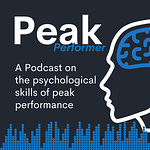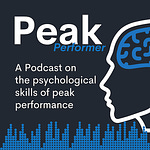Welcome to this week’s edition of the podcast. If you like what I’m doing here, share this episode with a friend, and post a comment. Many thanks for your support!
Welcome to episode 15 of Peak Performer. Today, we're exploring the mental skills that elite performers use to excel in their fields, whether it is business, education, sport, the workplace or elsewhere. The skills we’ll discuss in this episode can be developed and refined by consistent practice, like any other skill. These mental skills can help to regulate our psychological and emotional state, prepare us for big events, and help us cope effectively with the unforeseen.
At Peak Performer Podcast, I bring you the latest research and practical advice on performance psychology, mindset, and motivation. Our goal is to provide you with the tools and techniques that top performers use to stay at the top of their game. Each episode is packed with expert interviews, scientific insights, and actionable tips to help you unlock your full potential.
> Read this in-depth article for more on psychological skills
Episode Content
Introduction to Psychological Skills Training
Psychological Skills Training (PST) is a systematic practice of mental skills aimed at enhancing performance and increasing enjoyment across various domains, from sports to business. This training involves techniques for self-regulation, mental preparation, and recovery, making it essential for high-level achievement.
1. Cognitive Restructuring
Cognitive restructuring involves changing negative thought patterns into positive ones. It's about reframing experiences to manage stress and improve performance. By altering our automatic responses, we can cultivate a more constructive mindset.
How to Apply It:
Accept that things will not always go according to plan
Replace self-defeating thoughts with positive affirmations.
Practice reframing negative experiences in a supportive environment.
2. Self-Regulation
Self-regulation is the ability to control one's emotional and physiological responses to stressful conditions. This skill is crucial for maintaining optimal arousal levels and managing anxiety during high-pressure situations.
How to Apply It:
Partner with someone who will hold you accountable.
Maintain a balanced diet and take short breaks to manage stress.
Practice deep breathing exercises.
Meditate daily for 15 mins.
3. Mental Rehearsal
Mental rehearsal involves imagining and feeling a performance scenario in advance to prepare mentally, emotionally, and physiologically. This practice engages the same neural pathways as actual performance, helping to build confidence and reduce anxiety.
How to Apply It:
Visualise your routine in detail, focusing on the process rather than the outcome.
See, hear, smell, taste, and feel as you would in that actual situation.
Use mental rehearsal as part of your daily preparation routine.
4. Self-Talk
Self-talk refers to the internal dialogue we have with ourselves. Positive self-talk can enhance performance by reinforcing confidence and focus. Negative self-talk can have a detrimental impact on performance.
How to Apply It:
Be mindful of your internal dialogue and replace negative thoughts with encouraging ones.
Use short, positive cues during practice and performance to boost morale.
When things don’t work out, speak to yourself as you would a friend.
5. Goal Setting
Effective goal setting guides actions and maintains motivation. Rather than rigidly pursuing specific outcomes, focus on process-oriented goals that enhance daily performance.
How to Apply It:
Establish your values - know what you stand for. This is your anchor in the world.
Set SMART, values-based, and process-focused goals.
Stay present and concentrate on improving 1% each day rather than fixating on long-term outcomes.
Conclusion
Psychological skills are vital for achieving peak performance in any field. By incorporating cognitive restructuring, self-regulation, mental rehearsal, self-talk, and goal setting into your routine, you can enhance your resilience, focus, and overall performance. Remember, the journey to excellence is continuous, and these skills will help you navigate the ups and downs along the way.
Thank you for tuning in to this episode of Peak Performer Podcast. Be sure to subscribe and stay connected for more insights and strategies to help you reach your peak. Until next time, keep pushing your limits and striving for greatness!
Discount Code: QADISC30 for 30% off Work & Business Coaching













Share this post